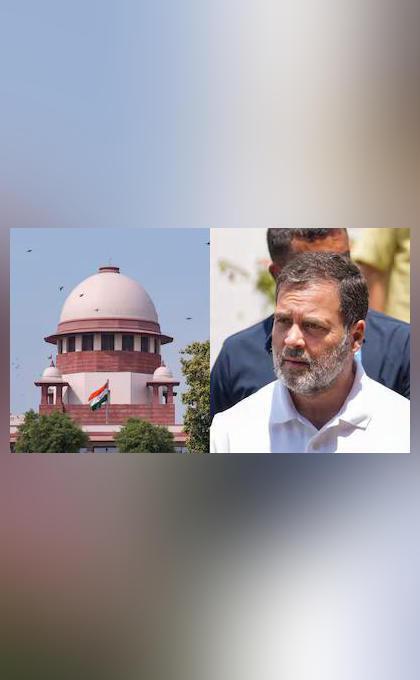
Why Ask on Social Media & Not in Parliament: SC to Rahul on ‘Land Grab’ Claim
The Supreme Court has once again taken a firm stance against those who use social media to spread unsubstantiated claims and half-baked facts. This time, the court’s attention has been drawn to Congress leader Rahul Gandhi’s statement that China had grabbed 2,000 square kilometers of Indian land. In a recent hearing, the court rebuked Rahul Gandhi, asking him to explain why he makes such claims on social media instead of taking them to the Parliament, where he could have been held accountable for his statements.
The controversy dates back to 2020, when Rahul Gandhi made the claim about China grabbing Indian land during a rally in Wayanad, Kerala. The statement was met with widespread criticism and many experts disputed the claim. However, the court’s intervention has brought the matter to the fore once again.
The Supreme Court, while staying a defamation case against Rahul Gandhi for his remarks about the Indian Army, asked him to explain how he knew that 2,000 square kilometers of Indian land was occupied by China. The court’s stern rebuke was a reminder of the importance of verifying facts before making public statements, especially in a digital age where misinformation can spread like wildfire.
The court’s statement has sent a strong message to politicians and public figures alike: that they must be held accountable for their statements, whether made on social media or in public forums. In an era where social media has become a primary means of communication, it is crucial that we maintain the highest standards of truth and transparency.
Rahul Gandhi’s claim about China grabbing Indian land was not the first time he had made a statement that was later disputed by experts. In the past, he has been known to make statements that are factually incorrect or exaggerated, often without providing evidence to back them up. While it is understandable that politicians may want to make bold statements to grab attention, it is essential that they also take responsibility for the consequences of their words.
The Supreme Court’s intervention in this case is a welcome development, as it highlights the importance of fact-checking and accountability in public life. In a democracy, it is essential that citizens have access to accurate and reliable information, and that public figures are held accountable for their statements.
In recent years, there has been a growing trend of politicians making unsubstantiated claims on social media, often without providing evidence or facts to back them up. This can have serious consequences, as it can spread misinformation and create confusion among citizens.
The Supreme Court’s rebuke of Rahul Gandhi is a reminder that politicians must be held accountable for their statements, whether made on social media or in public forums. It is essential that we maintain the highest standards of truth and transparency in public life, and that we encourage public figures to verify facts before making statements.
In conclusion, the Supreme Court’s decision to stay the defamation case against Rahul Gandhi is a significant reminder of the importance of fact-checking and accountability in public life. The court’s rebuke of Rahul Gandhi’s claim about China grabbing Indian land is a welcome development, as it highlights the importance of verifying facts before making public statements.
The case also serves as a reminder that social media is not a suitable platform for spreading unsubstantiated claims or half-baked facts. Rather, it is essential that we use social media responsibly, by verifying facts and providing evidence to back up our statements.
As citizens, it is our responsibility to demand accountability from our public figures, and to encourage them to maintain the highest standards of truth and transparency. By doing so, we can create a more informed and responsible public discourse, and ensure that our democracy remains strong and resilient.






